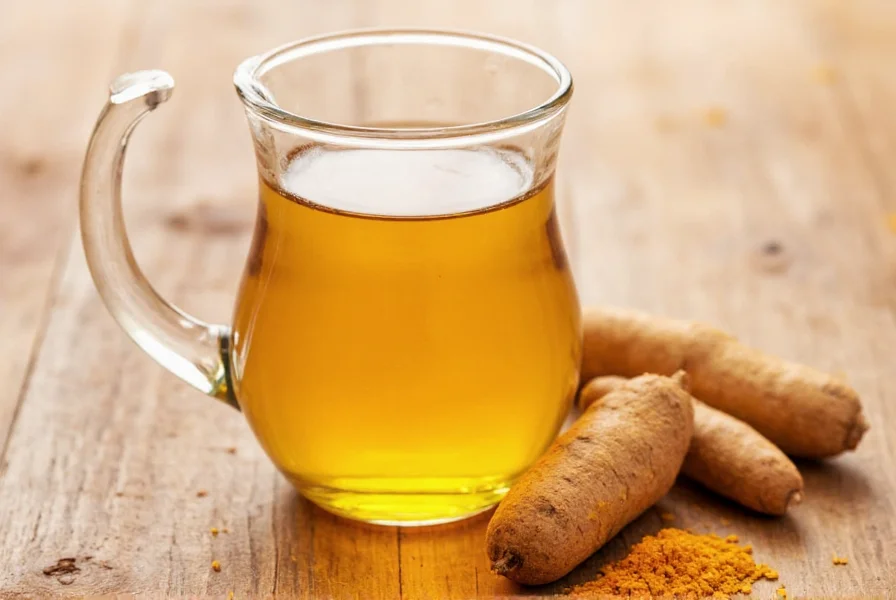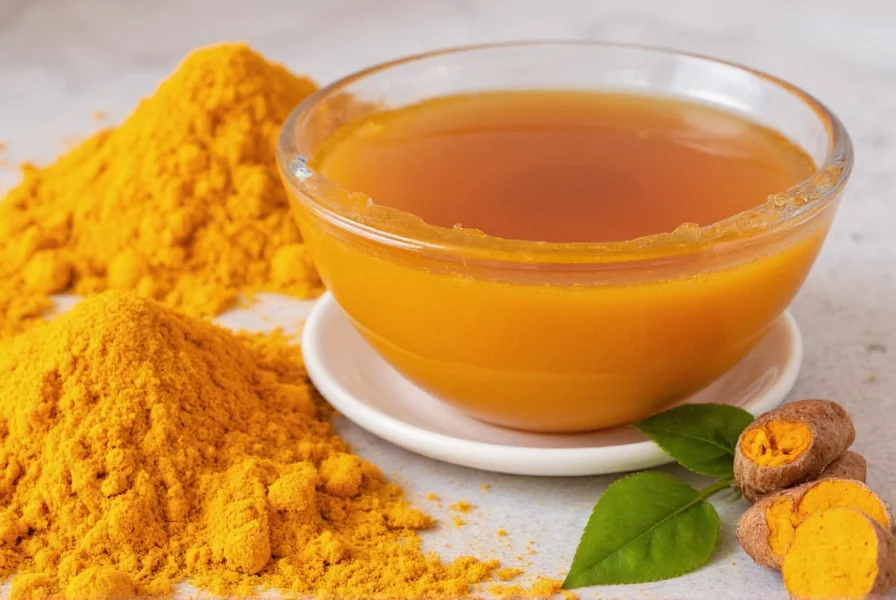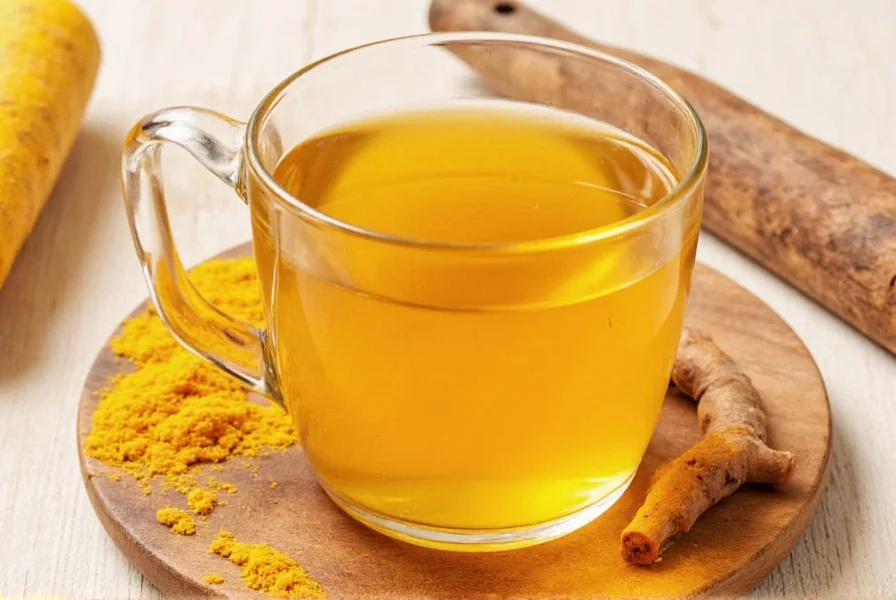For centuries, turmeric tea has been a staple in traditional wellness practices across Asia. Modern science now validates many of these historical uses, particularly regarding inflammation management and cellular protection. This golden-hued beverage contains curcumin, a potent polyphenol that gives turmeric its distinctive color and most of its health-promoting properties.
Unlike supplements, turmeric tea delivers curcumin in a gentle, bioavailable form when prepared correctly. Adding black pepper (containing piperine) and a healthy fat like coconut oil significantly enhances curcumin absorption—up to 2,000% according to research published in Planta Medica. This preparation method transforms turmeric from a poorly absorbed compound into an effective wellness beverage.
The Science Behind Turmeric Tea Benefits
Curcumin's molecular structure allows it to interact with multiple biochemical pathways simultaneously. A comprehensive review in the Journal of Medicinal Food analyzed over 700 studies, confirming curcumin's role in modulating more than 700 genes related to inflammation and oxidative stress.
| Health Benefit | Scientific Evidence Level | Recommended Daily Intake |
|---|---|---|
| Anti-inflammatory effects | Strong clinical evidence | 500-1000mg curcumin (2-3 cups) |
| Antioxidant protection | Extensive laboratory evidence | 500-1000mg curcumin |
| Digestive support | Moderate clinical evidence | 250-500mg curcumin (1-2 cups) |
| Joint comfort | Good clinical evidence | 500-1000mg curcumin |
Preparing Turmeric Tea for Maximum Benefit
The traditional preparation method significantly impacts effectiveness. To create properly bioavailable turmeric tea:
- Simmer 1 teaspoon of freshly grated turmeric root (or ½ teaspoon powder) in 2 cups of water for 10 minutes
- Add a pinch of black pepper (0.1-0.2g) to enhance absorption
- Include 1 teaspoon of healthy fat like coconut oil or ghee
- Optionally add ginger for complementary benefits
- Strain and enjoy warm, preferably between meals

Understanding Realistic Expectations
While turmeric tea offers notable benefits, managing expectations is crucial. Research in Advances in Experimental Medicine and Biology indicates that curcumin's effects are generally subtle and cumulative. Most studies showing significant results used standardized extracts providing 500-2000mg of curcumin daily—equivalent to 2-8 cups of properly prepared tea.
Individual responses vary based on metabolism, existing health conditions, and preparation method. Those with inflammatory conditions often report noticeable improvements within 4-8 weeks of consistent consumption. However, turmeric tea should never replace prescribed medical treatments for serious conditions.
Safety Considerations and Potential Interactions
Turmeric tea is generally safe for most people when consumed in culinary amounts. However, certain precautions apply:
- May interact with blood thinners like warfarin
- Could exacerbate gallbladder issues in susceptible individuals
- Pregnant women should limit consumption to culinary amounts
- High doses may cause gastrointestinal discomfort
The European Food Safety Authority considers up to 3mg of curcumin per kilogram of body weight daily as safe. For a 70kg adult, this equals approximately 210mg of curcumin—roughly one cup of properly prepared turmeric tea.
Comparing Turmeric Tea to Other Forms
While supplements provide concentrated curcumin, turmeric tea offers unique advantages:
- Natural synergy with other compounds in whole turmeric
- Gentler on digestion than high-dose supplements
- No risk of excessive dosing when consumed as a beverage
- Provides hydration benefits alongside curcumin

Integrating Turmeric Tea Into Your Wellness Routine
For optimal results, incorporate turmeric tea consistently rather than sporadically. Morning consumption supports daytime inflammation management, while evening tea may aid overnight recovery processes. Pairing with vitamin C-rich foods like lemon can further enhance absorption.
Those seeking specific health outcomes should maintain consistent consumption for at least 6-8 weeks before evaluating effectiveness. Remember that turmeric tea works best as part of a comprehensive wellness approach including balanced nutrition, regular exercise, and adequate sleep.
Conclusion: Evidence-Based Perspective on Turmeric Tea Uses
Turmeric tea represents a time-tested wellness practice now supported by modern science. Its primary uses center around inflammation management, antioxidant protection, and digestive support. While not a miracle cure, properly prepared turmeric tea delivers measurable health benefits when consumed consistently as part of a balanced lifestyle. The key to effectiveness lies in proper preparation that maximizes curcumin bioavailability and realistic expectations about its gradual, supportive role in overall wellness.
How often should I drink turmeric tea for health benefits?
For general wellness, 1-2 cups daily provides sufficient curcumin. Those seeking specific anti-inflammatory benefits may benefit from 2-3 cups daily, properly prepared with black pepper and healthy fat to enhance absorption. Consistent daily consumption over several weeks yields the best results.
Can turmeric tea help with arthritis symptoms?
Research suggests turmeric tea may help reduce arthritis-related inflammation and discomfort. A study in the Journal of Medicinal Food found curcumin supplementation comparable to certain anti-inflammatory medications for osteoarthritis symptoms. While tea provides lower curcumin concentrations than supplements, regular consumption as part of a comprehensive approach may offer noticeable benefits for some individuals.
When is the best time to drink turmeric tea?
Morning consumption supports daytime inflammation management, while evening tea may aid overnight recovery. Some prefer drinking it between meals for optimal absorption, though those with sensitive stomachs might benefit from consuming it with food. Consistency matters more than specific timing—choose a schedule you can maintain daily.
Does turmeric tea interact with medications?
Turmeric may interact with blood thinners like warfarin, potentially increasing bleeding risk. It might also affect diabetes medications and certain chemotherapy drugs. If you take prescription medications, particularly blood thinners, consult your healthcare provider before regularly consuming turmeric tea. The risk is generally low with culinary amounts but increases with higher consumption.











 浙公网安备
33010002000092号
浙公网安备
33010002000092号 浙B2-20120091-4
浙B2-20120091-4